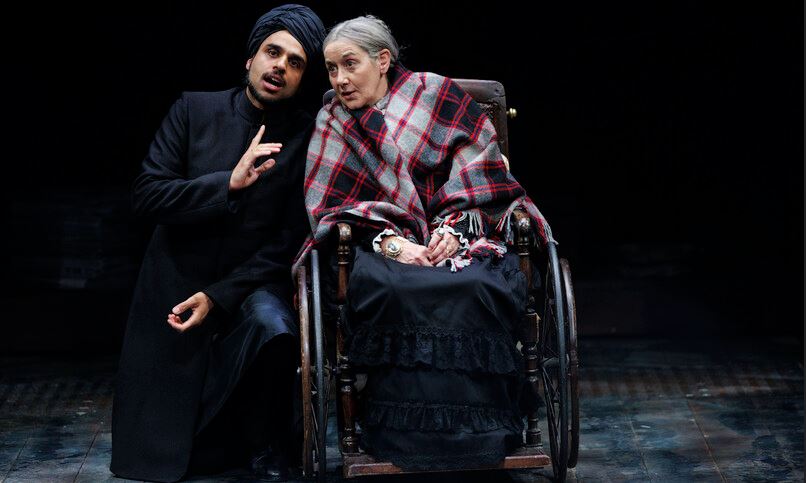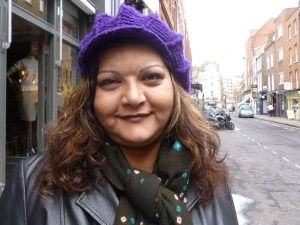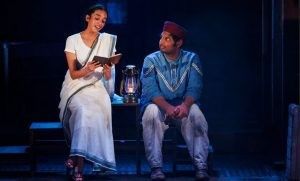- Wednesday, July 02, 2025
The play explores The Queen’s bond with ‘Munshi’ Karim and her Indian subjects

By: Amit Roy
LET’S allow ourselves a bit of artistic licence and imagine Queen Victoria has slipped into the Hammersmith Lyric to take a peek at Tanika Gupta’s play, The Empress, a retelling of the story of her relationship with Abdul Karim and her Indian subjects in general.
“We are amused,” the Queen declares. “Where is Tanika Gupta? We are pleased to confer an MBE on her.”
Lady Sarah, her lady-in-waiting, who is not keen on anyone with a dark skin, protests: “Ma’am, the woman’s already got an MBE.”
The Queen is not going to be put off: “Make it a damehood then.”

She instructs Lady Sarah to fetch her Black Lives Matter poster.
“We are joining the demonstration in Parliament Square,” she announces.
“Ma’am, as it is, you have been dubbed the ‘woke Queen’ by the tabloids,” Lady Sarah warns.
The Queen has never heard the word before: “Woke? What is ‘woke’?”
“Anyone who is anti-racist, Ma’am,” Lady Sarah explains. “They say you show undue favour to your Indian servant, Abdul Karim.”
The Queen is enraged: “He is not a servant, please never refer to Abdul as such. He is our teacher.”
Now, the last line is from Tanika’s play, which has managed to make Queen Victoria look radical even by the standards of 2023. The Royal Shakespeare Company’s production of The Empress has transferred to the Hammersmith Lyric (by the way, I don’t think the Queen would much like its unisex toilets) from the Swan Theatre in Stratford-upon-Avon.
I first saw The Empress at the Theatre Royal Stratford East in 2014. In fact, Tanika began working on the play 15 years ago. But this latest version at the Lyric – directed by Pooja Ghai, whom I first encountered years ago as an actress – is much more dramatic.
For example, Victoria’s letters to Karim are burnt on stage following the Queen’s death in 1901 on the orders of her son, Prince Edward (“Bertie”), who has succeeded to the throne as Edward VII.
All in all, it’s a fun evening which I can recommend to Eastern Eye readers.
Maybe it was Tanika’s ambition to paint a picture of the lives of Indians in Britain at the end of the 19th century. But it is the character of Queen Victoria – portrayed so well by Alexandra Gilbreath – that I find so fascinating. And Rahul Bajaj is excellent as Abdul Karim, who is a “gift” to her as a servant from Agra to mark her golden jubilee in 1887.
She promotes him to the role of her “Munshi” and keeps him close to herself until her death. What a pity her letters to Karim were burnt, because so much history went up in flames. Once she was gone, our Abdul was given his P45 and deported on the first ship back to India.
All the nastiness that Indians suffered is reflected by Lady Sarah (Francesca Faridany is very good in the role). At one point, she reports that Bertie “has complained that he feels swamped by Indian servants in the palace”.
Tanika is clearly recalling Margaret Thatcher, who said in a 1978 TV interview that “people are really rather afraid this country might be rather swamped by people with a different culture”.

The playwright has also woven in the love story of an Indian ayah, Rani Das (played sensitively by Tanya Katwal), and the lascar Hari (Aaron Gill).
Tanika slips in politics, too, in the character of Dadabhai Naoroji (Simon Rivers), who makes history as the first non-white MP when he is elected the Liberal member for Finsbury by five votes. Queen Victoria makes the prime minister, Lord Sainsbury, apologise for claiming “a black man” could never be elected an MP. I wonder what he would have made of “Dishy Rishi”. There are also parts for two young Indians who have come to London to train as barristers – MK Gandhi (Anish Roy) and Muhammad Ali Jinnah (Chris Nayak). Pakistan, a homeland for India’s Muslims, was then the last thing on Jinnah’s mind, for he tells Naoroji: “I want to serve you, sir.”
Naoroji finally decides England is not for him: “I am going back to live my old age out in my motherland, surrounded by people who listen to me. I believed in British fairness, but actually it’s a myth. John Bull is nothing more than a drug pusher, a slave trader and a violent thug.”
He – or is it Tanika? – also condemns “this war-mongering Tory government…”
The playwright has taken a few artistic licences. Karim is shown teaching Hindi to the Queen – actually, it was Urdu.
There is a touch of Bollywood when Victoria asks: “How does one say ‘I love you’ in Hindi?” She reaches out and kisses Karim’s hand after repeating his words: “Me tum se pyar karti hun.”
I like it when Tanika is naughty, getting in the obsession that tabloids currently have with Harry and Meghan, the Duke and Duchess of Sussex.
Lady Sarah draws the Queen’s attention “to the properties you have allotted the Munshi… Frogmore Cottage in Windsor, Arthur Cottage at Osborne and now you are talking of a third at Balmoral”.
Victoria, who appears to be getting at right-wing media, says with a straight face: “It will be known as ‘Karim Lodge’.”

I first heard about the Munshi from the historian, Kusoom Vadgama. In 2019, Miles Taylor, professor of modern history at York University, published his definitive Empress: Queen Victoria and India. Victoria was formally proclaimed Empress of India in 1876 following the uprising/the Sepoy mutiny/the first war of independence of 1857.
Victoria did not question the principle of imperial rule, but she was sympathetic to Indians – and wanted greater equality for them against the wishes of her own courtiers, and especially her son. And this comes through in Tanika’s play.
Lady Sarah is only too happy to pass on Bertie’s view that he and other “gentlemen of the royal household” would boycott the Queen’s impending visit to Nice if Karim accompanied her in any role other than a servant and made him a Companion of Honour.
“This is intolerable,” is the reaction from the Queen, who adds, “Nobody – whether family, government or household – is going to tell me whom I can employ or even have as a friend and confidante. To me, it is a person’s character that is important, not their position in the social hierarchy. I refuse to place my trust exclusively in aristocrats and courtiers. I will defend those in whom I place my trust to the last breath in my body.”
She goes on: “Convey this back to Bertie. Unless the royal court starts to treat our loyal servant with more respect, we will refuse to attend a single event connected to our Diamond Jubilee. Do we make ourselves clear?”
Ultimately, the Queen has to back down, because she is warned she faces being declared insane and replaced on the throne by Prince Edward.
But she does make the point: “They have all hated Abdul from the moment he stepped into my presence. They want to keep him in place. A lowly, illiterate Muslim clerk. They will not accept that he is their equal.”
Incidentally, Tanika has joined some 60 playwrights in donating an annotated script – The Empress, in her case – to a charity, Good Chance.
The money raised by Christie’s auction, Out of the Margins, is “much more about working with refugee artists and providing employment,” Tanika told Eastern Eye. “It’s quite an interesting kind of enabling charity as opposed to just handing out clothes. There are so many amazing artists among those refugees. It’s quite nice to be able to do something artistic with them.”
The Empress is at the Hammersmith Lyric until next Saturday (28)